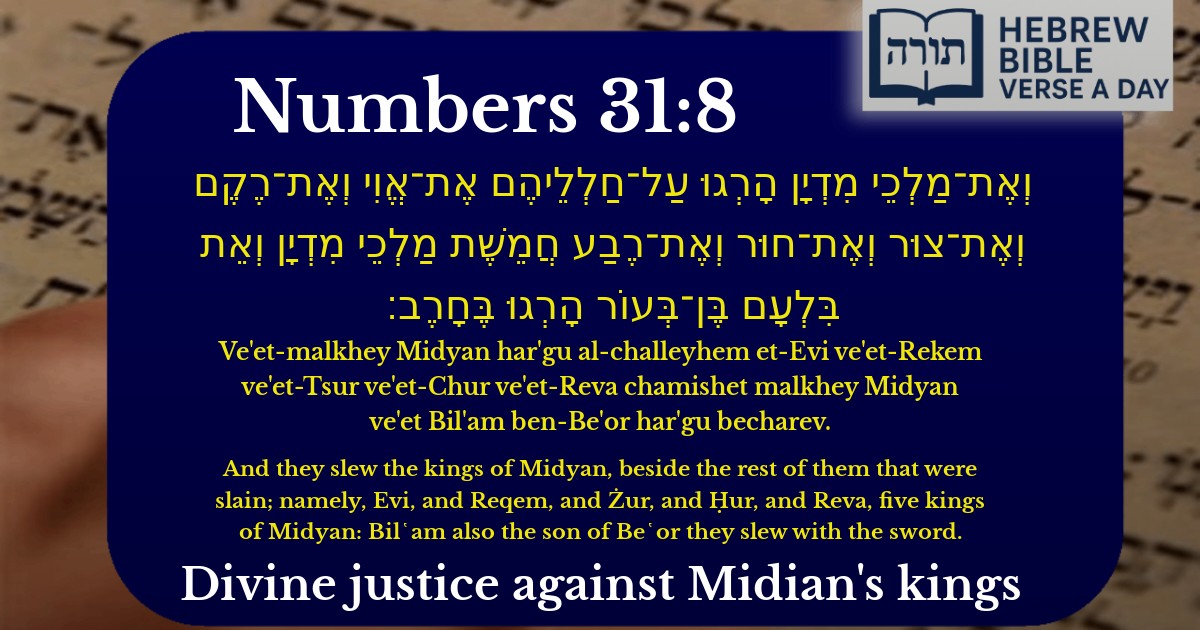Frequently Asked Questions
Q: Why did the Israelites kill the kings of Midian?
A: The Israelites killed the kings of Midian as part of a divine command to punish Midian for leading Israel into sin through the incident at Baal Peor (Numbers 25:1-9). According to Rashi, Midianite women seduced Israelite men into idolatry and immorality, causing a plague. This battle was a response to that spiritual corruption.
Q: Why is Balaam (Bil'am) mentioned among the slain?
A: Balaam is mentioned because, according to the Talmud (Sanhedrin 106a), he advised the Midianites to entice the Israelites into sin (as seen in Numbers 31:16). Though he was initially hired to curse Israel, when that failed, he resorted to causing them to sin, making him complicit in their downfall. His death was divine retribution for his role in this scheme.
Q: What is the significance of listing the names of the five Midianite kings?
A: Listing the names emphasizes the completeness of the victory and fulfills the command to avenge Israel (Numbers 31:2). The Midrash (Bamidbar Rabbah 22:4) teaches that each king represented a different aspect of Midianite power, and their defeat showed that no part of their leadership remained to threaten Israel again.
Q: How does this verse relate to Jewish teachings about war and justice?
A: This verse illustrates the Torah's principle of measured justice. The Rambam (Hilchot Melachim 6:1-4) explains that wars like this were only permitted when commanded by Hashem to rectify a grave spiritual or physical threat to Israel. The killing of Balaam and the kings was not random violence but a necessary response to their active role in corrupting the nation.
Q: What lesson can we learn from the mention of Balaam's death?
A: Balaam's death teaches that even someone with great spiritual potential (he was a prophet, as noted in the Talmud, Brachot 7a) can fall into evil if they misuse their gifts. The Mishnah (Avot 5:19) contrasts Balaam's wicked traits with Avraham's virtues, showing that intentions matter—Balaam sought personal gain, while Avraham sought to serve Hashem.


The Slaying of the Midianite Kings and Bilam
The verse recounts the execution of the five Midianite kings and Bilam ben Beor during the war against Midian (Bamidbar 31:8). This event holds significant theological and moral implications in Jewish tradition.
Significance of the Five Kings
Rashi (Bamidbar 31:8) explains that these five kings correspond to the five nations that Balak, king of Moab, gathered against Israel (Bamidbar 22:4). The Midrash Tanchuma (Matot 3) suggests that each king represented a different aspect of Midianite opposition to Israel:
The Execution of Bilam
The inclusion of Bilam's death here is particularly noteworthy. The Talmud (Sanhedrin 106a) states that Bilam came to collect his reward for advising the Midianites to seduce Israel (Bamidbar 31:16). Rambam (Hilchot Avodat Kochavim 1:3) cites this as an example of how even a non-Jew who attempts to lead Israel astray is subject to capital punishment.
Rashi notes that while the kings were killed in battle, Bilam was specifically executed by sword (becharev), suggesting a formal judicial execution. The Midrash (Bamidbar Rabbah 22:5) explains this distinction - the kings fell in combat, but Bilam was tried and executed as punishment for his role in the sin of Baal Peor.
Moral Lessons
The Ramban (Bamidbar 31:8) derives from this episode that one must eradicate evil at its source. The five kings represented the political leadership that authorized the campaign against Israel, while Bilam represented the spiritual corruption. Both aspects needed to be addressed to properly eliminate the threat to Israel's spiritual integrity.